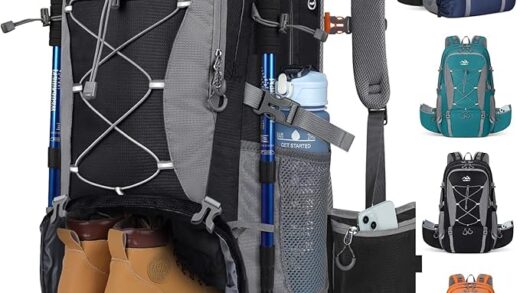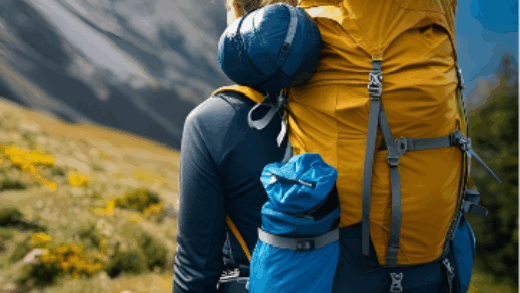Hiking is one of the best ways to enjoy the outdoors, clear your mind, and get some exercise—but even the easiest trails can turn dangerous if you’re not properly prepared. Whether you’re out for a few hours or tackling an all-day trek, having the right gear with you is essential for both comfort and safety.
Here are 10 critical items you should always carry when heading out on a hike—no matter the distance or difficulty level.
1. Reliable Navigation Tools
Never rely solely on trail signs or memory. Always bring a map, compass, or a GPS device—ideally a combination of these. Even a smartphone with offline trail maps can work well, but don’t forget a backup battery or power bank in case it runs out of juice.
📌 Why it matters: A wrong turn or unmarked fork in the trail can happen easily. Navigation tools help you stay on track or find your way back.
2. Plenty of Water + Water Purification
Hydration is key on any hike. Bring more water than you think you’ll need, especially in hot or dry climates. And because clean water sources aren’t guaranteed, pack a portable water filter, purification tablets, or a UV purifier so you can refill safely if needed.
📌 Why it matters: Dehydration can lead to headaches, fatigue, and dangerous situations if you’re stuck longer than expected.
3. Energy-Rich Snacks
Bring food that’s lightweight, nutritious, and easy to eat on the go. Think granola bars, nuts, trail mix, jerky, or dried fruit. For longer hikes, toss in a ready-to-eat meal or an extra snack or two in case of delays.
📌 Why it matters: Food keeps your energy up and your mind sharp, especially on longer or more strenuous hikes.
4. Compact First Aid Kit
Accidents can happen anywhere. A basic first aid kit should include bandages, antiseptic wipes, blister treatment, pain relievers, and any personal medications you need. Customize it based on the hike’s location and length.
📌 Why it matters: Small injuries like cuts, scrapes, or twisted ankles can become serious if untreated.
5. Weather-Appropriate Clothing + Rain Gear
Always check the weather before your hike, but also prepare for sudden changes. Dress in layers so you can add or remove clothing as needed. A lightweight rain jacket, hat, and gloves can be lifesavers when the weather turns.
📌 Why it matters: Being cold and wet can lead to hypothermia, even in the summer months.
6. Multi-Tool or Pocket Knife
One small tool can do a lot—cutting rope, slicing food, fixing gear, or even handling first aid needs. A multi-tool or sturdy folding knife is a small but mighty addition to your pack.
📌 Why it matters: It’s a survival tool that takes up very little space but can serve many purposes.
7. Headlamp or Flashlight
Even if you’re planning to finish before dark, always bring a light source. A headlamp is best because it keeps your hands free, but a small flashlight also works. Make sure to pack extra batteries.
📌 Why it matters: Trails get dark fast—and getting lost or stuck after sunset without light can be dangerous.
8. Emergency Shelter
Pack a compact emergency bivy, mylar blanket, or ultralight tarp. These are small, lightweight, and can keep you dry and warm if you get stranded or injured and need to wait for help.
📌 Why it matters: In case of unexpected delays, this can prevent hypothermia or exposure to the elements.
9. Fire Starter
A lighter, waterproof matches, or a ferro rod can be a lifesaver. Fire provides warmth, light, comfort, and a way to signal for help. Consider also bringing some fire-starting material, especially if the area is wet or windy.
📌 Why it matters: Fire can mean survival in emergencies—don’t count on finding dry wood or perfect conditions.
10. Sun Protection
Even on overcast days, UV rays can be harmful. Always carry sunscreen (SPF 30 or higher), lip balm with SPF, and sunglasses. A hat and lightweight clothing can also protect your skin from sunburn.
📌 Why it matters: Sun exposure can lead to burns, dehydration, and heat exhaustion—especially at higher altitudes.
Final Word: Be Prepared, Not Overloaded
Packing for a hike isn’t about carrying your whole house on your back—it’s about bringing smart essentials that could help in a pinch. These 10 items form the foundation of safe and responsible hiking. Depending on your specific trail, environment, and duration, you may add or tweak a few things—but never skip the basics.
Next time you lace up your boots, take a moment to check your bag. A few extra ounces of gear could mean a world of difference if the trail throws you a curveball.





